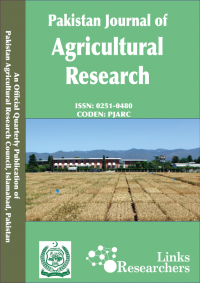WOMEN COTTON PICKERS PERCEPTIONS ABOUT HEALTH HAZARDS DUE TO PESTICIDE USE IN IRRIGATED PUNJAB
Mazher Abbas*, Irfan Mehmood*, Arshed Bashir*, Muhammad Ather Mehmood* and Sonila Hassan*
ABSTRACT
In Pakistan, cotton crop has special importance from the perspective of largest employment generation both for males and females in the production and value chains. Cotton picking is primarily a female specific activity in all cropping zones of Pakistan. Women cotton pickers mostly belong to poor rural society involved in this labour force to feed their families. Cotton pickers in Pakistan face some serious health related problems due to heavy use of pesticides on cotton crop. The present study was designed to investigate the problem faced by women cotton pickers and their role in household decision making. Overall 150 women cotton pickers were interviewed from Bahawalnagar, Sahiwal and Vehari districts of cotton-wheat zone of the Punjab. Summary statistics of women cotton pickers' showed mean average age was 33 years and had 2.4 years of formal schooling and 10 years of cotton picking experience. The main reasons for cotton picking reported were to reduce family financial burden (30%) followed by better access to food and resource (23%) and better education of children (21%). Majority of the respondents (97.33%) reported that the mode of payments of cotton picking was in cash and the most of the respondents (83.70%) reported that they got wages in time. Only few respondents (8.70%) were aware of health hazards due to pesticides and only 10% women wear protective clothes during cotton picking. Majority of the respondents (76%) wash their clothes after cotton picking whereas almost all the respondents wash their hand after cotton picking. The women cotton pickers faced health problem, tiredness (54.5%), mental disturbance (9.90%) and fatigue (8.00%). More than 58% women reported their involvement in household decision making regarding food and groceries while 30.6% women involved in decision about education of children. It is suggested that the female cotton pickers should be educated about the importance (in terms of disease treatment and long-run health costs) of using safety measures during and after cotton picking.
To share on other social networks, click on any share button. What are these?







